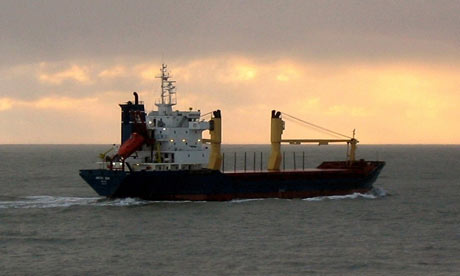
Russia claims hijackers seized the Arctic Sea, above, in international waters off Sweden. Photograph: STR/Reuters
The Arctic Sea, officially carrying a cargo of timber worth $2m, disappeared en route from Finland to Algeria on July 24. The vessel vanished into thin air after sailing through the English Channel, a curious case that engaged the attention of Finnish police, Swedish investigators, Interpol, and the Russian Navy. Before people could really jump into theories about pirates in European waters or the existence of a “Bermuda Channel” in the Atlantic Ocean, the boat was recovered off West Africa on August 17 and its eight alleged hijackers were arrested. But the mystery is still not solved.
The whole saga got even more curious when reports came out that the ship carried Russian arms for Iran. Sources in Tel Aviv and Moscow claimed the ship was loaded with S-300 missiles, Russia’s most advanced anti-aircraft weapon, while undergoing repairs in the Russian port of Kaliningrad. Mossad is said to have tipped off the Russian government that the shipment had been sold by former military officers linked to the underworld.
Russia has come out and strongly denied the media reports that the Arctic Sea was carrying a secret cargo of anti-aircraft weapons destined for Iran. Though, as reported in the Sunday Times, since the Arctic Sea was retaken, Russia has imposed a security blackout. The hijackers, the crew and two investigative teams were flown back to Moscow. For more than a week after being freed the crew were not allowed to talk to their families. The captain and three crew are still on board the ship, which has resumed its voyage to Algeria, but they have not been able to call home.
While this case still remains a puzzle, there have been several recent confirmed reports about Iranian attempts at acquiring weapons. First there was the news that a ship detained by the United Arab Emirates carried arms for Iran from North Korea. The Wall Street Journal reported that the UAE stopped the Iran-bound ship in Dubai about a month ago and informed the United Nations that it found various small weapons, including detonators and rocket launchers, from North Korea onboard. Under U.N. sanctions imposed on North Korea, Pyongyang is barred from exporting any weaponry. All countries, including Iran, are barred from importing weapons from North Korea, as well.
Then there were headlines about the Belgian man who was arrested by U.S. authorities on charges he sought to buy weapons for Iran. Jacques Monsieur was plotting to export illegally engines for the F-5 fighter or C-130 military aircraft. As the AFP notes the engines, known as J85-21 models, can be used to replace the motors in the F-5 fighter jet that was sold to Iran by the United States before the 1979 Iranian revolution. Today, they are on a special US list and barred from export from the United States without a special permit. They are also not allowed to be exported to Iran without an additional license from the Treasury Department.
Picture taken from the Guardian.